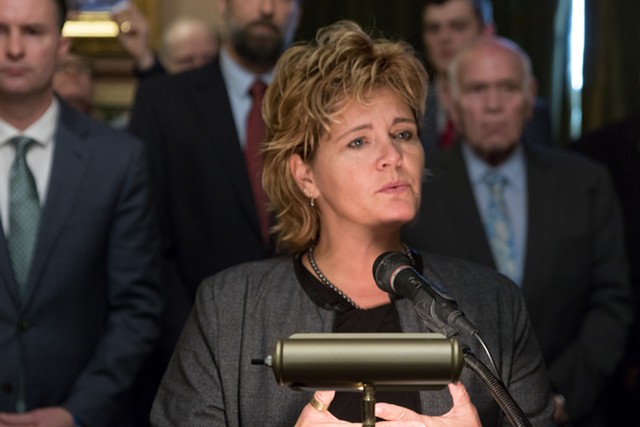
- File: Colin Flanders
- Rep. Sarah Copeland Hanzas
Campaign finance reformers
have spent years seeking to limit the flow of corporate cash into Vermont elections. Now a bill that would do just that is being watered down by a House committee.
The bill in question,
S.47, was
originally drafted to prohibit corporations from making direct donations to Vermont candidates and political parties. It passed the Senate last March by a vote of 21 to 5 but languished in the House thereafter.
A year later, the House Committee on Government Operations is poised to approve the bill later this week — with one major change: It would continue to allow political parties to accept corporate contributions.
"My intent is to make sure that we're limiting the influence that corporations have over elected officials after they become elected officials," said Rep. Sarah Copeland Hanzas (D-Bradford), who chairs the committee. Banning corporate contributions to parties, she argued, was not necessary because those would result in "less of a direct connection" between donors and lawmakers.
Copeland Hanzas said the change to the bill came out of a "group discussion" in committee, though it's unclear whether any particular interest group was calling for it.
Vermont Democratic Party chair Terje Anderson said his organization had not taken a position on the matter. He said his party generally supports the bill but is skeptical that it would achieve much because, either way, corporate interests could continue influencing the political process through independent expenditures made by super PACs and dark money organizations.
"It's not going to, one way or the other, take corporate money out of politics, either in this state or nationally," Anderson said.
The Vermont Progressive Party prefers the bill as passed by the Senate, according to executive director Josh Wronski.
The latest version of the bill would seem to open an obvious loophole: Because political parties can donate unlimited sums of money to candidates, corporations could simply shift their donations to parties and earmark the money for candidates they favor. Copeland Hanzas said she didn't expect such maneuverings to take place.
Sen. Chris Pearson (P/D-Chittenden), who sponsored the original bill, said he was "glad to see it getting traction" in the House. But, he added, "It's frustrating that they're not willing to go a little further."
A spokesperson for Republican Gov. Phil Scott, Rebecca Kelley, said her boss "believes most Vermonters will want to see campaign finance reform that's fair and equally applies standards to all."
The House committee planned to approve the bill Tuesday, but Rep. Jim Harrison (R-Chittenden) introduced a last-minute amendment intended to increase penalties for political action committees and other groups that fail to disclose their donors. The committee appeared generally receptive to the idea but wanted to see the language of the amendment refined.
Copeland Hanzas said she now expects a vote on Thursday, after which the entire House would have to approve it. The Senate and House would then have to resolve their differences before sending the bill to Scott.











Comments (2)
Showing 1-2 of 2
Comments are closed.
From 2014-2020, Seven Days allowed readers to comment on all stories posted on our website. While we've appreciated the suggestions and insights, right now Seven Days is prioritizing our core mission — producing high-quality, responsible local journalism — over moderating online debates between readers.
To criticize, correct or praise our reporting, please send us a letter to the editor or send us a tip. We’ll check it out and report the results.
Online comments may return when we have better tech tools for managing them. Thanks for reading.